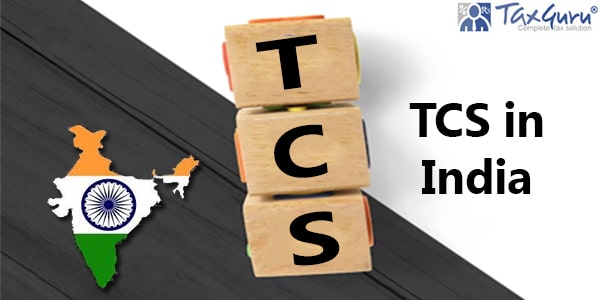Introduction: Tax Collected at Source (TCS) is a crucial element in India’s taxation system, obligating sellers to collect taxes from buyers during the sale of goods. This article provides a comprehensive overview, outlining who needs to deduct TCS, classifications of sellers and buyers, and exemptions applicable. Additionally, recent changes and amendments, including exemptions for non-resident buyers, are discussed.
What is TCS ?
Tax Collected at Source (TCS) is a tax payable by a seller which he collects from the buyer at the time of sale of goods.
Who is Required to Deduct TCS?
Specific people need to deduct TCS who is seller.
Classification of Seller for TCS
Certain individuals or organizations fall under the category of sellers responsible for the collection of tax at the source. Only those listed below have the authority to collect tax at source from buyers; no other sellers are permitted to do so:
- Central Government
- State Government
- Local Authority
- Statutory Corporation or Authority
- Company registered under the Companies Act
- Partnership firms
- Co-operative Society
- Any person or HUF who is subjected to an audit of accounts under the Income-tax Act for a particular financial year.
Classification of Buyers for TCS
A buyer is a person who obtains goods of specified nature in any sale or right to receive any such goods, by way of auction, tender or any other mode.
Non-Applicability of TCS
- The below buyers are exempted
- Public sector companies
- Central Government
- State Government
- Embassy of High commission
- Consulate and other Trade Representation of a Foreign Nation
- Clubs such as sports clubs and social clubs
- Where resident buyer utilises such purchase for the purposes of manufacturing, processing or producing articles or things or for the purposes of generation of power (not for trading) and gives this declaration in writing in duplicate.

There are two main cases where Tax Collected at Source (TCS) is exempted: Section 206C(1A)
Case 1: Goods purchased for personal consumption
TCS is not applicable if the goods are purchased by an individual for personal consumption. This means that if you buy a car, a piece of jewelry, or any other item for your own use, you will not be subject to TCS.
Case 2: Goods purchased for manufacturing, processing, or production
TCS is not applicable if the goods are purchased by a buyer who intends to use them for manufacturing, processing, or production. This means that if you buy raw materials, machinery, or other supplies for your business, you will not be subject to TCS.
In order to claim this exemption, the buyer must submit a declaration in Form 27C to the seller. The declaration must state that the goods are to be used for manufacturing, processing, or production and not for trading purposes. A copy of the declaration must be submitted to the Chief Commissioner or Commissioner of Income Tax within seven days of the end of the month in which the sale is effected.
Goods Means For this Purpose :-
Alcoholic liquor for human consumption , Tendu leaves, Timber obtained under a forest lease, Timber obtained by any mode other than (c), Any other forest produce not being timber or tendu leaves, Scrap, Minerals, being coal or lignite or iron ore.
This Exemption is not Applicable on Other Than Section 206C(1) i.e 206C(1C), 206C(1F) etc.
CBDT notifies that provisions of Section 206C (1G) of Income Tax Act shall not apply to a person (being a buyer) who is a non-resident in terms of section 6 and who does not have a permanent establishment (PE) in India.
Circular to remove difficulty in implementation of changes relating to Tax Collection at Source (TCS) on Liberalised Remittance Scheme (LRS) and on purchase of overseas tour program package ]
Finance Act, 2023 has amended sub-section (1G) of section 206C of the lncome-tax Act, 1961 (hereinafter referred to as’the Act’) to, interalia,
- increase the rate of Tax Collection at Source (TCS) from 5o/o to 20% for remittance under LRS as well as for purchase of overseas tour program package; and
- remove the threshold of Rs 7 lakh for triggering TCS on LRS.
These two changes did not apply when the remittance is for education and medical purpose.
Threshold of Rs. 7 Lakh per financial year per individual in clause (i) of sub-section (1G) of section 206C shall be restored for TCS on all categories of LRS payments, through all modes of payment, regardless of the purpose: Thus, for first Rs 7 Lakh remittance under LRS there shall be no TCS. Beyond this Rs 7 Lakh TCS shall be applicable.
Conclusion: Navigating the complexities of TCS in India is vital for both sellers and buyers. Understanding classifications, exemptions, and recent changes ensures compliance with taxation regulations. Sellers must be aware of their obligations, while buyers should stay informed about exemptions and thresholds to manage their transactions effectively.
*****
Disclaimer:- The information available on this website/Application is solely for informational purposes. We make no representation or warranties of any kind, express or implied about the accuracy, reliability, with respect to information and material or video available on website/Application, any reliance you place on such information is therefore strictly at your own risk. We are not liable for any consequence of any action taken by you relying on the material/information provided on this website/Application





